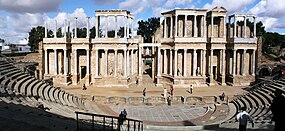
Masona or Mausona[1] (died c. 600/610) was the Bishop of Mérida and metropolitan of the province of Lusitania from about 570 (certainly by 573) until his death. He is famous for exercising de facto rule of the city of Mérida during his tenure as bishop and for founding the first confirmed hospital in Spain.
He was a Visigoth and originally an Arian, but converted to Roman Catholicism probably in the middle of the 6th century,[2] though some have supposed as late as 579. His biographer says he "was indeed a Goth, but was wholly devoted to God with very ready heart," i.e. Catholic.[3] He entered the church young and served from an early period in the Basilica of Saint Eulalia at Mérida, which had been rebuilt in her honour by Bishop Fidelis around 560. Masona is said to have had such a close relationship with Eulalia that by his prayers, and her intercession, a plague ravishing all Lusitania was lifted.[4] Though no writings of his are known to have survived, Masona was probably educated in a manner similar to men of classical learning, such as the contemporary Leander of Seville, with whom he shared an exile for a time.
© MMXXIII Rich X Search. We shall prevail. All rights reserved. Rich X Search
